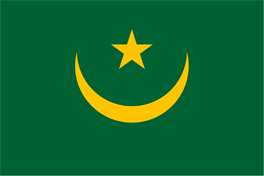 |
République islamique de MauritanieIndependence 28 November 1960
History Mauritania is a West African and Saharan country home to Arab-Berber and black populations. It's also a country of emigration. It becomes a French colony following military expeditions launched from Senegal. In 1904, it becomes part of French West Africa; beginning in 1920, it is administered from Saint-Louis by the governor of Senegal. Resistance to French colonization surges in the 1920s; nationalism emerges after the Second World War. The French change strategy and make Mauritania an overseas province, with its own representatives in French Parliament. On 20 May 1957, the lawyer Moktar Ould Daddah is named to head the first autonomous government. The desire for further autonomy grows and independence is granted on 28 November 1960, despite the opposition of Morocco and the Arab League, which refuse to recognize Mauritania because they consider the territory part of Morocco. French and Spanish support prevent Morocco's attempt to annex the territory. Moktar Ould Daddah is elected the republic's first president. Its conflict with Morocco over Western Sahara causes serious crises in Mauritania, and its war with the Polisario Front, supported by Algeria, plunges the country into political instability. A long drought begins in 1978. The country gains autonomy, certainly, but its organizational capacity is limited. French companies such as MIFERMA (Mines de fer de Mauritanie) control the country politically and economically. On 10 July 1978, Moktar Ould Daddah is overthrown by a military coup d'état. Lieutenant Colonel Mohammed Ould Saleck replaces him. Since then, Mauritania has experienced several military coups and political instability. Jacob Sabakinu Kivilu (UNIKIN) |


